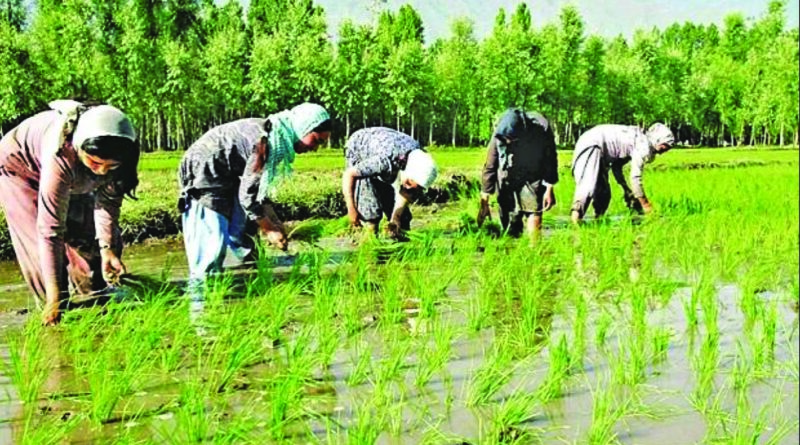FARMER PRODUCER ORGANISATIONS (FPOs) – AN AVENUE FOR FINANCING TO FARMERS
Abstract
India has about 12.5 Crore farmer households of which over 85% are small and marginal farmers with land holdings of less than 2 hectares. The average size of land holding is 1.33 hectare/ farmer household. Due to this fragmentation and disorganization, farmers face constraints such as procuring inputs like seeds and fertilizers at reasonable prices, lack bargaining power in the market, realizing better value for their produce, access to technology, etc. As a result majority of the small producers are unable to realize optimal value from their farming operations and make economic progress. On the other hand, in case of non-farm sector activities, the problems relate more to the quality of the product and marketability. It is felt, by organising themselves collectively, producers can utilize scale to procure inputs at a lower price, and gain more selling power for their produce/product. Forming a producer organization can provide a strong platform to take up collective business activities, build capacity and provide linkages to markets.
Concept of FPO’s – A brief introduction
A Farmer Producer Organisation is a legal entity formed by primary producers, viz. Small and marginal farmers, which is directly engaged in agriculture and allied activity as crop production, dairy, fishery, animal husbandry, poultry, bee-keeping and sericulture etc. Various policy level initiatives are being taken by Government aimed at promoting the concept of producer organizations. Some of them include, having a dedicated source of funding to FPOs from the Rashtriya Krishi Vikas Yojana (RKVY), Equity Grant and Credit Guarantee Fund Scheme by Small Farmers Agribusiness Consortium (SFAC) for Farmer Producer Companies, setting up of Producers Organizations Development Fund (PODF) in NABARD and PRODUCE fund of Government of India etc. A FPO can be a producer company, a cooperative society or any other legal form which provides for sharing of profits/benefits among the members.
Essential features of a FPO
- Formed by a group of producers for either farm or non-farm activities.
- It is a registered body and a legal entity.
- Producers are shareholders in the organization.
- It deals with business activities related to the primary produce/product
- It works for the benefit of member producers.
- A part of the profit is shared amongst the member and rest of the surplus is added to its owned funds for business expansion.
Need of formation of FPO
The main aim of FPO is to ensure better income for the producers through an organization of their own. Small producers do not have the volume individually to get the benefit of economies of scale. Besides, in agricultural marketing, there is a long chain of intermediaries who very often work non-transparently leading to the situation where the producer receives only a small part of the value that the ultimate consumer pays. Collectivization of producers, especially small and marginal farmers, into producer organisations has emerged as one of the most effective pathways to address the many challenges of agriculture but most importantly, improved access to investments, technology and inputs and markets. Department of Agriculture and Cooperation, Ministry of Agriculture, Govt. of India has identified farmer producer organisation registered under the special provisions of the Companies Act, 1956 as the most appropriate institutional form around which to mobilize farmers and build their capacity to collectively leverage their production and marketing strength.
Current status of FPO
As on 31.03.2019 totally 897 FPOs are in existence in India, which were formed under various initiatives of the Govt. of India (including SFAC), State Governments, NABARD and other organizations. Of these, 792 FPOs are registered as Producer Companies and the remaining as Cooperatives/ Societies, etc. Majority of these FPOs are in early stage of their operations with shareholder membership ranging from 100 to over 1000 farmers and require not only technical hand holding but also adequate credit, capital and infrastructure facilities including market linkages for sustaining their business operations.
The typical structure of a FPO
| State level | Policy advocacy, explore wider markets, strategic partnerships |
| Cluster level
(10-12 Villages) |
Credit, inputs, technology, capacity building, Marketing linkages |
| Village level | Crop planning, Seed production, demonstration, Knowledge sharing, aggregation |
Formation of FPO:
To ensure sustainability and economic viability of FPOs/POs, their nurturing plays an important role in taking up viable business activities like aggregation of produce, collective marketing, bulk procurement of inputs, primary processing, etc. To meet the credit requirements of FPOs/POs in various stages of their life viz. Initial phase, Growing phase, and Maturity phase, the loan products mentioned below have been introduced.
Opportunities for financing to FPOs by banks
To ensure sustainability and economic viability of FPOs, their nurturing plays an important role in taking up viable business activities like aggregation of produce, collective marketing, bulk procurement of inputs, primary processing, etc. To meet the credit requirements of FPOs in broadly categorized into three phases.
- Incubation and Early Stage:
At this stage, the financial need of the FPOs revolves around the cost of mobilizing farmers, registration cost, cost of operations and management, training, exposure visits etc.
- Emerging and Growing Stage:
Once FPOs are incubated with grant support from promoting institutions, there are three ways to raise fund to meet their working capital and investment need. They include – Equity Financing, Credit Capital and Debt Financing.
- Matured Stage (Business Expansion):
As the FPOs move towards expanding their businesses, they need finance for quality improvement in products/services. Here, finance is required for quality improvement along the value chain of the produce. So the loan products mentioned below have been introduced.
- Loan Products with availability of Collateral/Guarantee Cover
- Loans to POs/FPOs that are eligible for assistance from SFAC towards equity/credit guarantee cover.
- Loans to FPOs and other POs that are not eligible for assistance from SFAC towards equity/credit guarantee cover and offering collaterals.
- Loans to Promoting Institutions, for on lending to POs.
- Loan Products without Collateral//Guarantee Cover
- Loans to POs that are not in position to provide collaterals.
- Loans to start up FPOs/POs with small size of business activities.
The items eligible for assistance broadly include capital cost such as cost of building, machinery and equipment for processing, specially designed vehicles for transportation etc. and working capital requirements for input supply, procurement, collective marketing, and other recurring costs connected with the project.
Support from Government of India
The Govt. of India in the Union budget 2018-19, announced the following measures to promote FPOs for a prosperous and sustainable Agriculture sector that enable farmers to enhance productivity through efficient, cost-effective and sustainable resource use and realize higher returns of the produce;
(i) Launching of “Operation Greens” for onion, potato and tomato crops on the lines of Operation Flood with an allocation of Rs. 500 crores. The initiative aims to address price fluctuation in vegetables for the benefit of farmers and consumers. It will promote FPOs, agri-logistics, processing facilities and professional management.
(ii) With a view to encouraging enabling environment for aggregation of farmers into FPOs and take advantage of economies of scale, the Govt. announced 100% tax deduction for FPOs with annual turnover of up to Rs. 100 crores.
Support from NABARD
- Financial Intervention- by direct lending to PO in one form of term loan and cash credit.
- Capacity building-Fund for skill development, training, planning and technical extension etc.
- Market linkage for setting-up of marketing infrastructure facilities for sale of produce.
Support from SFAC
- The entire government schemes for FPO are implemented by SFAC.
- Equity grant- Matching Equity Grant Maximum of Rs.10 Lakh per FPO for enhances borrowing power and enables them to access bank finance.
- Credit Guarantee Fund scheme- seek collateral-free loan up to 1.00 crore which in turn can seek 85 percent cover from the Credit Guarantee Fund.
Challenges
- Lack of access to affordable credit for want of collaterals and credit history is one of the major constraints, the FPOs are facing today. Further, the credit guarantee cover being offered by SFAC for collateral free lending is available only to Producer Companies.
- FPOs are mostly represented by SF/MF with poor resource base and hence, initially they are not financially strong enough to deliver vibrant products and services to their members and build confidence.
- Farmers’ Organizations are required to be efficiently managed by experienced, trained and professionally qualified person However; such trained manpower is presently not available in the rural space to manage FPO business professionally.
Benefits
- Cost of production can be reduced by procuring all necessary inputs in bulk at wholesale rates.
- Post-harvest losses can be minimized through value addition and efficient management of value chain.
- Improved bargaining power and social capital building.
- Aggregation of produce and bulk transport reduces marketing cost, thus, enhancing net income of the producer.
- Easy in communication for dissemination of information about price, volume and other farming related advisories.
Strategies to Finance to FPOs
The important factor considering increasing finance to FPOs is as under:
- Providing comprehensive early stage funding.
- Designing appropriate loan products as at the level of farmer member and at the FPO level.
- Encouraging value chain financing under priority sector lending.
- Ware house receipts based lending and price risk mitigation.
Suggestion to improve finance to FPOs
- It will be necessary to take up advocacy not only with different government agencies but also with banks and other financial institutions. SFAC and NABARD are already engaged and taking the lead particularly in working with the State Governments but the work with the banking sector needs momentum and hence.
- Despite RBI’s directive to banks on financing of FPOs.
- Many branches of banks are unaware of the policies regarding FPOs and they need to be educated.
- The awareness should start at state level and district level forums such as State Level Bankers Committee (SLBC) and District Consultative Committee (DCC) meetings held by banks. Applications from FPOs to the banks could be reviewed at these meetings to assess progress in implementation.
- Interest subvention for crop loan model can be extended to FPOs Since they are owned by small and marginal farmers.
- The need for ratings of FPOs on the lines of SHG rating would improve credit worthiness of the FPOs.
- Financing to FPOs should be given top priority for the bank.
Conclusion
In present scenario Farmer Producer Organizations (FPOs) has been considered as one of the way to overcome the challenges faced by the small and marginal farmers. This approach is to be more successful in breaking farmers’ dependency on intermediaries, and enabling them access better markets (inputs and output), financial services, Input supply services, Market services, Technical and networking services which is provided by FPOs to their members. Financial institutions have Potential Avenue for financing to FPOs and increase their priority sector advance portfolio with minimal default risk.
Reference
- Anika Trebbin and Markus Hassler.2012. Farmers’ producer companies in India: a new concept for collective action? “Environment and Planning A”. 44 (2), 411 – 427.
- CIKS & FWWB. Case Study on Farmers Producers Company.2017. Pp 2-4.
- Government of India (2013). Policy and Process Guidelines for Farmer Producer Organisations. New Delhi: Department of Agriculture and Cooperation, Ministry of Agriculture. Pp 16-32.
- Jayashree Bhosale.2018. NABARD to promote 5000 farmer producer organisations in next 2 years. ET Bureau.
- National Paper – PLP 2019-20. Farmer Producers’ Organizations (FPOs): Status, Issues & Suggested Policy Reforms. Pp 1 -10.
- sfacindia.com



